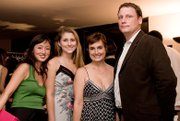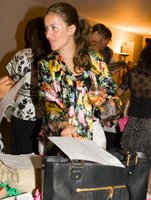Samantha Chang Finds Perfect Intimate Space With Boutique Lingerie Show
Samantha Chang started the Boutique Lingerie trade show for the same reason that many designers start their own clothing lines—to fill a personal need for something in the market. As a lingerie manufacturer and designer for the past five years, Chang struggled to find the right venue to sell her eponymous lingerie collection.
In 2004, she rented a suite at the Royalton hotel in New York and booked appointments with her buyers. In August 2005, other lingerie collections joined her in nearby suites. By February 2006, the number of lingerie collections snowballed to occupy an entire floor of the hotel.
Chang’s love of organizing kicked in, and she decided to brand the collective as the Boutique Lingerie show. She brought the show to the Gerry Building in downtown Los Angeles for the first time last March.
International and domestic lingerie lines, including Annabelle Joule, Arobatherapy, Beau Bra, Be6, Cadolle, Commando, Emily B Lingerie, Fleur’T, Garment Guard, Gentry de Paris, Hot Dot Greetingwear, Jimmyjane, Jodi Gallaer, Kiyomi PJs, Look No Wire by Acrobat, Myla, Papinelle, Samantha Chang, 2Belles, Simone Pegrave;reacute;le, Lavit, Aubade and Spoylt, have participated in New York or Los Angeles shows.
California Apparel News’ Rhea Cortado caught up with Chang to discuss her new role as a show organizer and future plans for the Boutique Lingerie show.
Why did you start the Boutique Lingerie show?
It’s what the market needs. I think I filled a void of what the lingerie wholesale market really needs. There are no other shows around that really give the small designers a chance to show with less money. If my show didn’t exist, most of [them] would not know what to do. I think the people who show at Boutique Lingerie share my vision.
What types of lines participate in the show?
Some are first-time showing. Some have been around longer. A lot of British designers like the exclusive atmosphere. There are people who are budget-conscious because the cost of my show is a lot less than Lingerie Americas [in New York]. If they rent out a room to show [at the New York Boutique Lingerie show], they also can stay in the room. So it’s a hugely cost-efficient show.
Do you have any plans to expand the show?
It depends on the demand. If we are going to expand into two floors [at the Royalton], we intend to fill up the entire two floors. But I’m a designer. The point is to provide an alternative. It wasn’t about focusing on expanding the show and taking business away [from another trade show] and finding a bigger and bigger venue. The lingerie business is a very intimate business. It’s not a ready-to-wear business that we’re just going to grow and grow and have more and more lines.
Before you brought Boutique Lingerie to Los Angeles, you exhibited in other trade shows. Why did you decide to bring your show to Los Angeles as well?
I just decided to focus on more lingerie boutiques, rather than ready-to-wear boutiques. Ready-to-wear boutiques like to spend more money on denim and T-shirts; that’s their focus. It’s no longer novelty for them to bring lingerie into their stores. A lot of intimate apparel stores, they prefer a much calmer, slower pace, which fits the intimate market better. I found out that there is a whole floor dedicated for intimate apparel in the Gerry Building. I contacted the building and they had empty showrooms, and that’s when I decided to rent out the space and put on the show.
What was the reaction to having this show in Los Angeles?
The [vendors] really like it. For Aubade [for example], their experience before the Boutique Lingerie show is they used to rent out the space that they could find at the California Market Center. They could be in the back of someone else’s showroom; they could be in an empty space that wasn’t really set up. The reps are really happy that now they [have] a home for them to go to every time there’s market.
How is the traffic at your trade show?
As long as you make appointments, the good stores are really interested in coming. It is a show where if you make the appointment, [buyers] will make the point and come see. Beau Bra of London had a great show [in New York] because they made an effort and contacted a lot of good stores, and they came and they had a great show. If you don’t make appointments, that’s tough. It’s appointment-driven versus traffic-driven.
Who is allowed to participate?
I don’t have a serious jury. I don’t ask them to send samples. I will ask for the brand’s price point. The price points are the better stores. The point of the jury is also to make sure it’s the right mix and that the vendor will be happy. If it’s the wrong mix, it’s not even about filling the space. The buyer doesn’t care if they don’t see something they want. It’s the vendor who’s showing, paying the money, and [who is] going to be feeling out of place if they’re not the right brand. It’s not for me to decide if their collection is pretty or not to be in the show. I don’t have to like the collection to let the person participate. It’s more just the price point. There’s always something for everyone. There’s certainly an aesthetic. At my show, mid to higher price points do better.
Has your lingerie line been more successful because of the show?
Not in the sense that my line sells better. A lot of the people who do my show know me from my line, because everyone is in the industry. I don’t find anyone as a conflict. People ask me, “Do you think it’s a conflict for me to do the show because our lines look too similar?” I don’t look at it that way. If it is a good line, we all bring good [buyers] in.
How have you enjoyed the experience of being a show organizer?
I like it. As a designer, I’m always looking for the right place to show my line, to find the right environment. I’ve been to a lot of trade shows. I know how, as a vendor at a show, it’s really important how you are being treated. You need to provide buyers with the right environment, everything put together, a little music, a little snacks, a little bit of everything is really important. Also, putting the right vendors together and the right price to do the show. If I can provide something [that feels right for me], I hope the person next to me will be happy also. I like organizing. I enjoy it very much.























